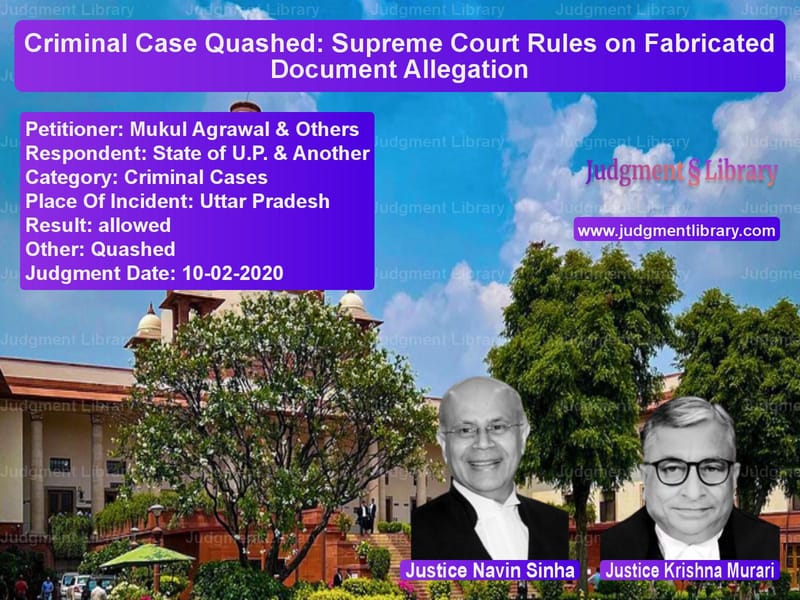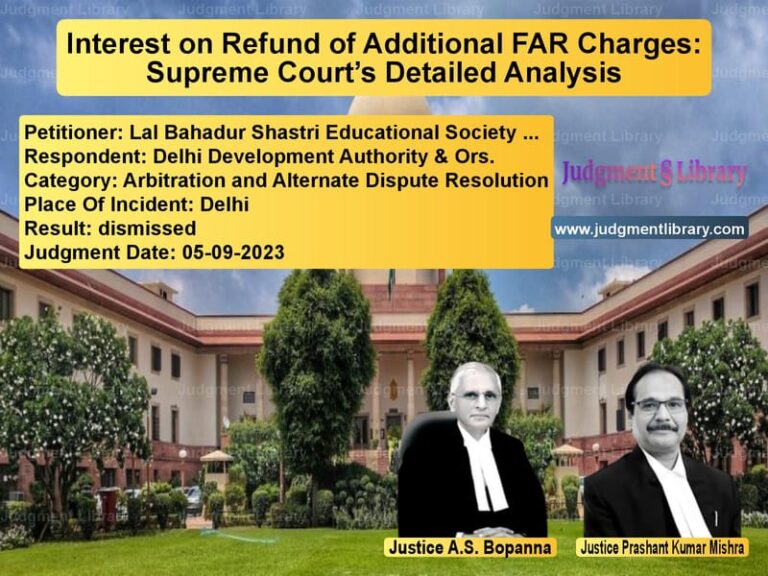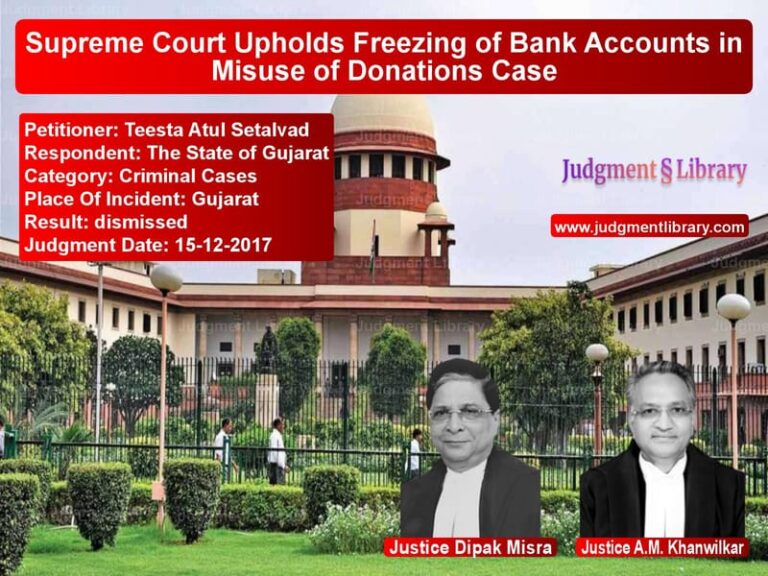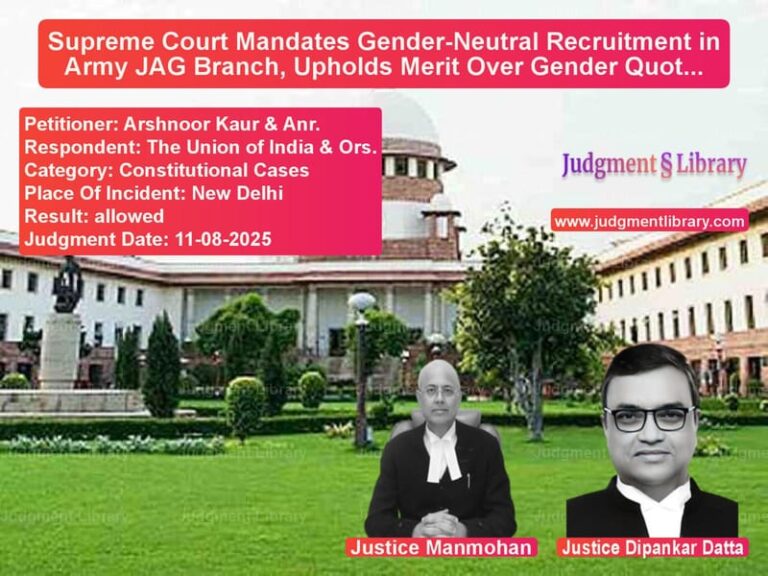Criminal Case Quashed: Supreme Court Rules on Fabricated Document Allegation
The Supreme Court of India recently delivered a significant ruling in the case of Mukul Agrawal & Others v. State of U.P. & Another, addressing the question of whether criminal proceedings should continue when the very basis of the complaint has been nullified by a civil appellate court. The judgment, delivered on February 10, 2020, sets a crucial precedent in cases involving allegations of fabricated documents in civil disputes.
Background of the Case
The case originated from a tenancy dispute between the complainant (Respondent No. 2) and the appellants. The complainant claimed to be a tenant in a shop and alleged that he was being wrongfully asked to vacate the premises. To assert his tenancy rights, he filed Original Suit No. 12 of 1996, seeking a permanent injunction against eviction, disconnection of essential services such as water and telephone, and other reliefs.
The appellants, on the other hand, contended that the complainant was not a tenant but was merely working in the disputed shop. They relied on an agreement dated March 30, 1988, to support their claim.
Criminal Complaint and Civil Suit
While the civil suit was pending, the complainant filed Complaint Case No. 2705/2003, alleging that the agreement relied upon by the appellants was a false and fabricated document. The complainant asserted that he had never signed such an agreement. The foundation of the criminal complaint was a handwriting expert’s opinion submitted in the civil court, which suggested that the complainant’s signature on the agreement was forged.
On May 13, 2015, the civil suit was decided in favor of the complainant. The trial court held that the agreement dated March 30, 1988, was indeed a forged and fabricated document. This ruling formed the basis for continuing the criminal proceedings under Sections 420 (cheating), 467 (forgery of valuable security), 468 (forgery for the purpose of cheating), and 471 (using a forged document as genuine) of the Indian Penal Code.
Appeal Against the Civil Court’s Judgment
The appellants challenged the trial court’s decision in Civil Appeal No. 17/2015. The appellate court, after considering the evidence, ruled in favor of the appellants and held that the agreement was not a false or fabricated document. This ruling negated the very foundation of the complainant’s criminal case.
High Court’s Decision and Supreme Court’s Intervention
Despite the appellate court’s ruling, the appellants’ attempt to have the criminal proceedings quashed under Section 482 of the Criminal Procedure Code (CrPC) was dismissed by the High Court of Uttar Pradesh on May 21, 2019. The High Court’s order did not examine the facts of the case in detail but merely cited legal principles on quashing of criminal proceedings.
Aggrieved by the High Court’s refusal to quash the case, the appellants approached the Supreme Court.
Key Arguments by the Parties
Arguments by the Appellants:
- The criminal complaint was solely based on the civil court’s initial finding that the agreement was forged.
- The appellate court had overturned this finding, conclusively ruling that the document was not fabricated.
- Since the basis of the criminal proceedings had been nullified, allowing the prosecution to continue would amount to an abuse of the legal process.
Arguments by the Respondents:
- The original finding of the trial court regarding the document’s falsity justified the criminal complaint.
- Quashing the case would set a precedent where accused individuals could escape criminal liability by merely obtaining a favorable ruling in civil court.
- Criminal proceedings should be independent of civil litigation, especially in cases involving serious charges like forgery and fraud.
Supreme Court’s Analysis
The Supreme Court, led by Justices Navin Sinha and Krishna Murari, critically examined the legal basis for continuing the criminal proceedings.
1. Lack of Reasons in the High Court’s Order
The Court expressed concern that the High Court’s decision merely listed legal principles on quashing cases without explaining why it declined to interfere. It emphasized that an order subject to challenge must be a reasoned and speaking order to facilitate meaningful judicial review.
2. Interrelation Between Civil and Criminal Proceedings
The Supreme Court reaffirmed that civil and criminal cases can proceed simultaneously but noted that in this case, the criminal complaint’s entire foundation had collapsed. The appellate court’s finding that the agreement was genuine meant there was no material evidence to support the criminal case.
3. Abuse of Legal Process
The Court reiterated that criminal law should not be used as an instrument of harassment, particularly when civil remedies exist. It cited established precedents that criminal proceedings should not be permitted when they are manifestly groundless.
Final Verdict
The Supreme Court ruled in favor of the appellants and quashed the criminal proceedings in Complaint Case No. 2705/2003. The Court held:
“In view of the conclusive opinion of the appellate court that the agreement dated 30.03.1988 was not a forged document, the very substratum of the criminal complaint vanishes. In the circumstances, to allow the appellants to be prosecuted will only be a complete abuse of the process of law.”
Implications of the Judgment
This ruling has several key implications:
- Reinforces the need for reasoned orders: Courts must provide detailed reasons when deciding cases, particularly when dismissing applications seeking quashing of criminal proceedings.
- Clarifies the interplay between civil and criminal cases: While both can proceed independently, a criminal case based solely on a civil finding cannot continue if the civil appellate court overturns that finding.
- Prevents misuse of criminal law: The judgment underscores that criminal proceedings should not be used to exert undue pressure in civil disputes.
- Sets a precedent for quashing baseless criminal cases: If the foundation of a criminal case is nullified by subsequent judicial findings, courts must step in to prevent unnecessary prosecution.
Conclusion
The Supreme Court’s decision in Mukul Agrawal & Others v. State of U.P. & Another serves as a crucial reminder that criminal prosecution cannot be sustained on a baseless foundation. The ruling protects individuals from wrongful prosecution and ensures that legal proceedings remain fair and just. This case sets an important precedent in preventing the misuse of criminal law in civil disputes.
Petitioner Name: Mukul Agrawal & Others.Respondent Name: State of U.P. & Another.Judgment By: Justice Navin Sinha, Justice Krishna Murari.Place Of Incident: Uttar Pradesh.Judgment Date: 10-02-2020.
Don’t miss out on the full details! Download the complete judgment in PDF format below and gain valuable insights instantly!
Download Judgment: Mukul Agrawal & Othe vs State of U.P. & Anot Supreme Court of India Judgment Dated 10-02-2020.pdf
Direct Downlaod Judgment: Direct downlaod this Judgment
See all petitions in Fraud and Forgery
See all petitions in Attempt to Murder Cases
See all petitions in Legal Malpractice
See all petitions in Judgment by Navin Sinha
See all petitions in Judgment by Krishna Murari
See all petitions in allowed
See all petitions in Quashed
See all petitions in supreme court of India judgments February 2020
See all petitions in 2020 judgments
See all posts in Criminal Cases Category
See all allowed petitions in Criminal Cases Category
See all Dismissed petitions in Criminal Cases Category
See all partially allowed petitions in Criminal Cases Category







